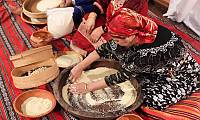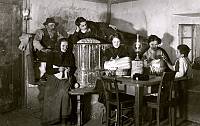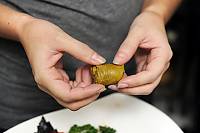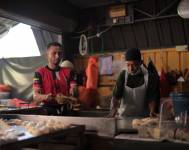
Knowledge, know-how and practices pertaining to the production and consumption of couscous
es, however, more formal transmission has also developed outside the family circle or home. The non-culinary aspects of the element – namely rituals, oral expressions and certain social practices – are also transmitted by the bearers. Couscous is a dish replete with symbols, meanings and social and cultural dimensions all linked to solidarity,... Algeria
, Morocco
, Tunisia
ion for artistic creations in fields such as the contemporary visual arts, design, architecture and culinary design. It is the creative expression of all those involved in the process, including the pattern designer and the bobbin lacemaker. Bobbin lacemaking has notable therapeutic functions, and is an ecologically clean and sustainability-oriente... Slovenia
The Committee Takes note that Lebanon has nominated Al-Man’ouché, an emblematic culinary practice in Lebanon (No. 02000) for inscription on the Representative List of the Intangible Cultural Heritage of Humanity: Al-Man’ouché is a flatbread prepared in homes and specialized bakeries, and enjoyed during breakfast by people of all backgrounds...8 December 2023
Kasane
io-economic development and cultural life, including farming, fishing, rituals, traditional skills, culinary techniques, sustainable food production, seed diversity, ecosystem preservation, and knowledge about nature and the universe. The project aims to build new knowledge and develop interactive tools to document, safeguard, and transmit foodwa...1 June 2023 - 31 December 2026
Dolma making and sharing tradition, a marker of cultural identity
rent communities. The tradition is present throughout the Republic of Azerbaijan, and is perceived as a central culinary practice in all regions. It is enjoyed on special occasions and gatherings and expresses solidarity, respect and hospitality. It is transmitted from generation to generation and transcends ethnic and religious boundaries within t... Azerbaijan
The Committee Takes note that Senegal has nominated Ceebu Jën, a culinary art of Senegal (no. 01748) for inscription on the Representative List of the Intangible Cultural Heritage of Humanity: Ceebu jën is a dish that originated in the fishing communities on the Island of Saint-Louis in Senegal. Although recipes vary from one region to the nex...18 December 2021
Online
Breakfast culture in Malaysia: dining experience in a multi-ethnic society
has been passed down from generation to generation to ensure the sustainability of local traditional culinary practices. Locals from different ethnic groups and genders unite around traditional breakfast delicacies. In addition to being a source of pride and a significant part of Malaysia’s gastronomic history, these morning dishes have also bec... Malaysia
mmittee Takes note that Singapore has nominated Hawker culture in Singapore: community dining and culinary practices in a multicultural urban context (no. 01568) for inscription on the Representative List of the Intangible Cultural Heritage of Humanity: Hawker culture in Singapore: community dining and culinary practices in a multicultural urb...19 December 2020
Paris
Sustaining Seperu folk dance and associated practices
he project is expected to contribute to sustainable development by safeguarding Belize’s foodways and culinary traditions and to enhance the country’s disaster risk preparedness and resilience. ,... Botswana
2023-08-02 - 28-02-2025
s and the ecosystem. There are also numerous social practices resulting from the practice as well as culinary and traditional medicine traditions. As in the past, the transmission of the element takes place mainly in tree beekeepers’ families and through the act of brotherhoods. Nowadays, however, workshops offer another mode of transmission duri...19 December 2020
Paris






